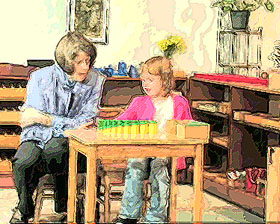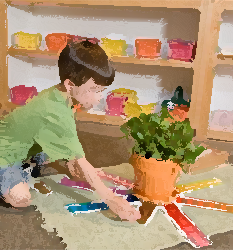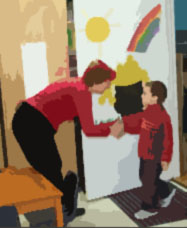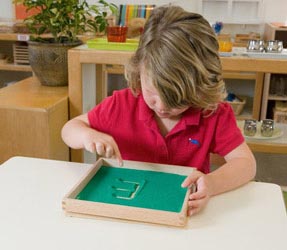
|
| Marcin Bajer released under the Creative Commons License, some rights reserved |
- “Often those adults who work tirelessly to encourage the habit of truth in the child surround him with the kind of falseness that cannot even be reckoned as a "little lie" but is premeditated and has as its end the deception of the child. In respect to this let me relate an anecdote about Christmas and Santa Claus.
“One day, a mother who resented painfully being a party to this particular deception confessed it to her little girl, who was so disappointed that she had been deceived that she was depressed for a week. Her mother wept when she recounted this little drama to me.
“But the situation is not always this serious. Another made the same confession to her little boy. He started to laugh and said, "Oh, Mamma! I’ve known for a long time that Santa Claus doesn’t exist!" "But why didn’t you ever tell me?" "Because it always made you so happy". The roles are often reversed. Children, who are the most acute observers, have pity on their parents and agree with them in order to please them.
“Many parents believe that their children should submit to order without any discussion.”
- — Dr. Maria Montessori
The Child in the Family, page 49
(A Montessori quick bite from The Center for Guided Montessori Studies)
Please note that the opinions regarding Santa Claus in this article are Dr. Montessori’s.
This parable of two children reacting so differently to the pretense of Santa Claus illustrates the profound depth to which we cherish our mysteries. But more significantly I believe it points to a great truth in how self-discovery of knowledge leads to ownership and mastery of knowledge.
A separate email could wrestle with the myth and value of the Santa Claus narrative. In this one, I wonder at the different ways the children responded. For the first child, who had believed in Santa, the adult imposition of knowledge was a clear blow. Perhaps for her Santa had been a real person, who in some sense had now died. The second child had already concluded that this was but a fable. For him, it had become a mutual game of make-believe, with no intentional trickery on the part of the adult.
The other day my family and I were driving a friend’s house. He was throwing a Christmas party where a guest was scheduled to come dressed in Santa regalia. Coming from a Jewish tradition, we never raised our daughter to believe in Santa. Once when she was younger she had asked about Santa, and we had answered quite frankly. But I couldn’t recall the last time we discussed the matter. Now, I wondered, what did our 8-year old daughter think about old St. Nick.
I asked her, would she like to have her picture taken with him?
There was an uncharacteristic quiet in the car. Finally, she said “No, because I don’t think that’s the real Santa Claus.” The real Santa! Because of the surrounding culture she had accepted and internalized the myth, even if it wasn’t our tradition, even though her parents had never even participated in what Dr. Montessori calls a deception.
“Oh,” I said. I resisted challenging her statement so I could consider it. Later, after the party, she volunteered that the actor – a particularly well whiskered fellow who stayed in character even with the adults present – probably had been the very Claus himself! Being completely flummoxed, I uttered another “oh” and left it at that.
Dr. Montessori’s anecdote above ends with a seemingly incongruous statement about adult expectations. Upon reflection, it seems that she wasn’t so much weighing in on the Santa story, as much as illuminating the ways in which adults can choose to communicate truths. The child who discovered a difficult truth himself suffered nothing, and indeed entered into a shared pretense with the parent. On the other hand, the little girl who had no suspicions suffered greatly. What else may have been a lie? What girder of her mental edifice would fall next? Could she trust adults at all?
As Montessorians, we believe that concrete necessarily precedes the abstract, and that pure fantasy is a sad cousin to the wonders of the natural world. Still, in actual fact, we seldom see this kind of devastating reaction. The innate strength and genius of children leads them relatively unscathed through life’s obstacle course. But of course a loving and humane adult doesn’t provide them with unnecessary impediments.
So what to do about my Jewish daughter who seems to have developed a faith in Santa Claus? The first thing I resolved was to not directly challenge the belief. It’s not just that I didn’t care to slap her down; we know that where possible the best way to acquire knowledge is through self-discovery. So I decided to try a Socratic approach.
“How does Santa deliver presents to all those children in one night?”
Maybe there are a lot of helpers, came the answer, they could share the work.
Another time I asked, “Do you think his elves make all the toys?”
Well, they probably buy a lot of them at the store.
Last night I posed another question. “What might he eat at the North Pole?”
She rolled her eyes. Dad, you know Santa’s not real, right?
“Oh,” I said.
Thoughts for the day:
- In the Montessori classroom we do not, of course, knowingly tell falsehoods to children. How do you communicate complex truths without confusing children, imposing one’s beliefs or stifling their curiosity?
- If you can remember one, consider how you feel about some realization you’ve attained. Do you feel differently in respect to the facts you’ve been taught versus those you’ve deduced?
- If you were raised believing in Santa Claus, do you remember when you discovered the truth? How did you react?

CGMS offers both teacher training and continuing education for professionals.
If you or your assistant could use a little boost in your classroom, we hope you will consider enrolling in one of the January 31st professional development courses. These include working with children with Special Needs, a Math Refresher, a Language Refresher, our Adventure in the Arts course, and our Classroom Leadership course, which is particularly useful to classroom assistants.
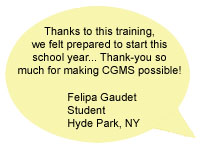
Our next Primary and Elementary teacher cohort groups begin soon. If you are interested in becoming a certified Montessori teacher, now is the time to enroll! In both our online-only Associate Certificate, and our low-residency Full Certificate program, you will get the same thorough and well-respected training from some of the world’s leading Montessori educators. The CGMS training program has been carefully designed to combine the best practices of over a century of Montessori training with the most up-to-date e-learning techniques. The result is an authentic program unlike any other.
To learn more about our teacher certification programs, please email us or visit our website at http://www.guidedstudies.com/montessori-certification-online.html.

